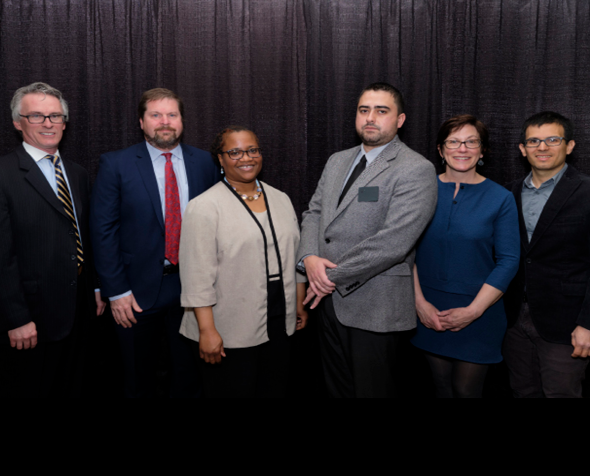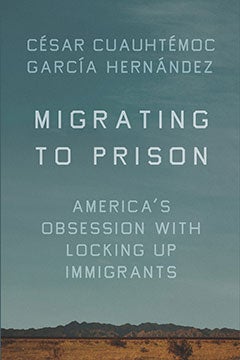Immigration Law and Policy Clinic Fall 2019 Updates & Faculty Highlights
ILPC students are currently advocating for the release of four immigrants in removal proceedings, each of whom has been in civil immigration detention for several months.
Now entering its second year, the Immigration Law & Policy Clinic (ILPC) continues to defend the rights of immigrants ensnared at the intersection of criminal and immigration law. ILPC students work under the supervision of Professors Christopher Lasch and Robin Walker Sterling. In July, the teaching team welcomed Clinical Teaching Fellow Tania Valdez, a Berkeley Law graduate with extensive immigration practice experience. The addition of Valdez increases the number and breadth of opportunities available to students through the ILPC.
This semester, nine ILPC students are currently advocating for the release of four immigrants in removal proceedings, each of whom has been in civil immigration detention for several months. ILPC students research complex legal problems, interview and counsel clients at the jail, and represent clients in immigration court hearings. Working in a detention facility where the vast majority of people do not have legal representation, ILPC students have the opportunity to apply, and continue developing, their legal skills while making a meaningful impact on their clients’ lives.
ILPC students take on some of the most difficult cases for detained clients who would otherwise be unable to obtain representation. Last year, through the extraordinary diligence and dedication of ILPC student attorneys, we were ultimately able to secure the release of nearly every detained client we represented. For example, student attorneys represented a client who was arrested by ICE at a routine probation visit. They conducted an extraordinarily complicated legal analysis, and their 37-page brief (with 70 pages of supporting exhibits) convinced the immigration court not only that the client was eligible for bond but that the removal proceedings should be terminated altogether.
In addition to their work on detained cases, ILPC students are currently representing several non-detained clients in their applications for relief from removal, including family hardship-based relief and asylum. Clinic students also contribute their legal expertise to support community partners in policy projects. Last year, for example, students contributed legal and other empirical research in support of Colorado SB 19-030, “Remedying Improper Guilty Pleas.” One student even provided supportive testimony before the house committee considering the bill, which ultimately passed and now provides an avenue for relief for noncitizens who face immigration consequences notwithstanding the fact that they have successfully completed deferred judgments, resulting in the dismissal of their criminal charges.
Recognizing that ILPC clients may be dealing with mental health issues, including the immediate traumas of incarceration and long-term separation from their families and communities, the clinic works with Jasmine Johnson, a graduate student in the University of Denver School of Social Work, to offer clients more holistic representation that fully addresses their needs.
In this era of increasing criminalization of immigrants, hyper-incarceration, and rapid changes to immigration law, the Immigration Law & Policy Clinic continues to center clients’ humanity and defend against injustice.
Immigration Law & Policy Clinic Faculty Highlights
Professor Christopher Lasch
“Sanctuary’ as Civil Rights Discourse.” Seminario internacionale: “‘crInmigración’: control de la inmigración y Derecho penal en perspectiva comparada.” Universidad Complutense. Madrid, Spain (Dec. 11, 2018).
“Cities as Havens: The Evolution of Sanctuary Policies.” (Panelist). Symposium: “Remodeling Sanctuary: Urban Immigration in a New Era.” Fordham University School of Law. New York, NY (Nov. 9, 2018).
“Sanctuary’ Values.” (Panelist.) Association of American Law Schools 2019 Annual Conference, Section on Immigration: “Immigration Values.” New Orleans, LA (Jan. 5, 2019).
“A common-law privilege to prevent immigration courthouse arrests.” (Panelist.) American Bar Association 2019 Midyear Meeting, Criminal Justice Section: “Putting ICE on ice.” Las Vegas, NV (Jan. 25, 2019).
Brief Amici Curiae of Legal Scholars in Support of Defendants' Motion to Dismiss Counts 1-3 of the Indictment, United States v. Judge Shelley Joseph, No. 19-cr-10141 (D. Mass. Sep. 13, 2019) (with Seth Davis and P. Sabin Willett) (arguing that prosecution of state-court judge—for allegedly obstructing justice and obstructing a federal proceeding, because she permitted defendant in state-court criminal proceedings to depart from state courthouse so as not to be arrested by federal immigration officials—violates the Tenth Amendment and is part of a trend of federal Executive overreach characterized by efforts to enlist and coopt state criminal systems in the service of federal immigration enforcement).
“The sanctuary lens: Seeing the values that shape our debates over sanctuary.” (Panelist.) University of California San Diego, United States Immigration Policy Section: “Immigration Politics & Policy in the Age of Trump.” San Diego, CA (Apr. 17, 2019).
Oral Testimony, “Protect Colorado Residents From Federal Government Overreach,” H.B. 19-1124, 72nd Gen. Assem. (Colo. Mar. 28, 2019), available here, (testimony is from 2:15:05 – 2:18:20).
Brief of Law Professors and National Immigrant Justice Center as Amici Curiae in Support of Respondents, Rodrigo Esparza, et al. v. Nobles Cnty., et al., No. A18-2011 (Minn. App. Mar. 13, 2019) (with Mark Fleming and Katherine Melloy Goettel) (arguing that arrest by state law enforcement officers based on detainer and administrative warrant issued by federal immigration officials, and/or detention pursuant to intergovernmental services agreement (IGSA) lacked authority under state law and Immigration and Nationality Act).
“Oregon Lawsuit Challenges State, Local Participation in Immigration Enforcement.” (with Mark Fleming, National Immigrant Justice Center). CRIMMIGRATION (Jan. 9, 2018).
“Sanctuary Cities and Protecting Immigrants and Refugees.” (Panelist). University of Minnesota Law School, Immigration Law Forum, “Civil Rights Behind Bars.” Minneapolis, MN (Nov. 2, 2018).
Associate Professor Robin Walker Sterling
Publications
Invisible Injustice: A Review of Punishment Without Crime: How Our Massive Misdemeanor System Traps the Innocent and Makes America More Unequal by Alexandra Natapoff, Journal of Community Psychology (forthcoming 2020).
Presentations
Presenter, Raising Race, Multi-Track Federal Criminal Defense Seminar, Federal Defender Services Office, Administrative Office of the United States Courts Training Division, Denver, CO (August 16, 2019).
Co-Presenter (with Profs. Brad Colbert, Perry Moriearty, Rachel Moran, And Carl Warren), Learning About The Forest By Examining The Trees: Discussing Systemic Concerns In The Context Of Direct Client Representation, Association of American Law Schools, 2019 Conference On Clinical Legal Education, San Francisco, CA (May, 5, 2019).
Co-Presenter (With Profs. M. Eve Hanan (UNLV, Boyd School of Law), Rachel Moran (University of St. Thomas School of Law), and Anne Traum (UNLV, Boyd School of Law), Webinar, Teaching Justice Through Misdemeanor Defense, Clinical Legal Education Association, Denver, CO (April 9, 2019).
Presenter, Implicit Bias and Talking About Race Issues In Voir Dire, Training, Office of the Colorado Public Defender, Denver, CO, (April 23, 2019).
Presenter, A New System of Juvenile Justice, Constitutional Law Workshop, University of Maryland School of Law, Baltimore, MD (March 8, 2019).
Panelist, “Maintaining Your Client’s Humanity In The Criminal Justice System,” In Pursuit of a More Perfect Union: DU’s Inaugural Civil Rights Summit, University of Denver Sturm College of Law, Denver, CO (February 15, 2019).




